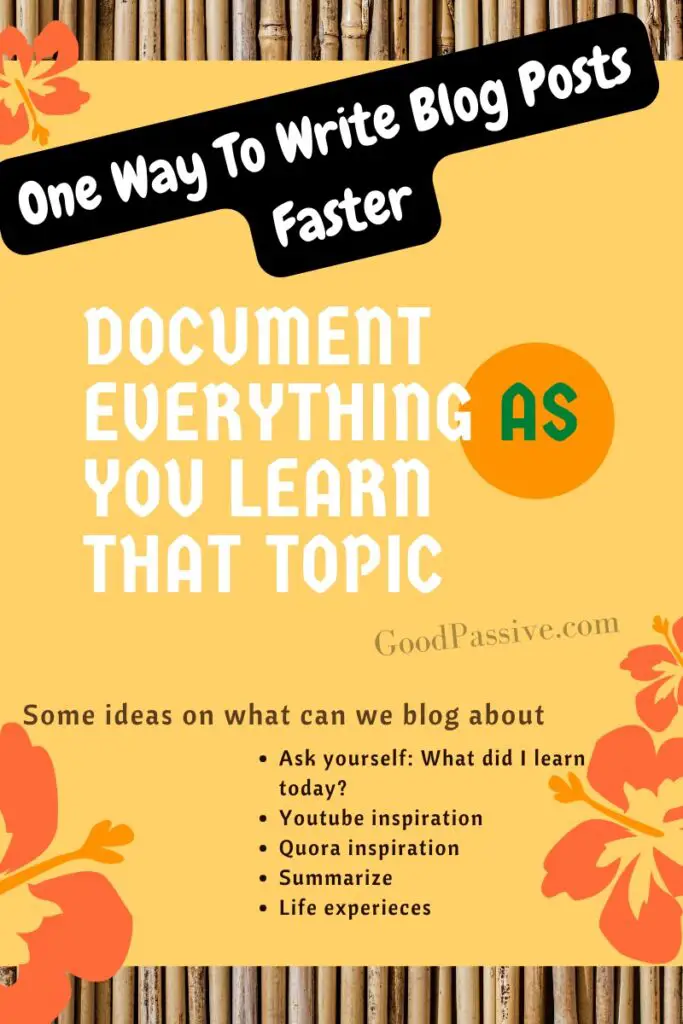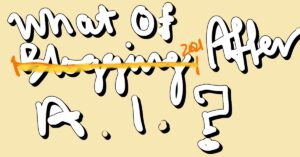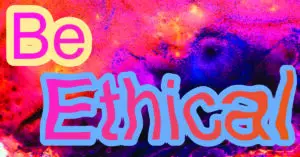
This blogging method is from my personal blogging realization and experience. That said, bloggers may find different methods that they can connect with, there is no one-cut-fits-all answer here.
A popular Quora answer I read recommends a speech-to-text conversational style to write. That can be really fast, I would admit, but only works in certain conditions. How would you write new non-fiction or technical topic that way? Or record modern visual elements with a tape recorder?
The beauty of this method is in the way it connects to a source of the true meaning of blogging in my humble opinion and there is no faster method I know to write valuable (especially non-fiction) content. Let’s get to it.
One way to write blog posts faster:
- Document everything AS you learn that topic
The keyword here is ‘as’. Not before, not after. Many people do not realize the power of the basic knowledge they learned or problems they solved along the way can be exactly what someone may and will need and search for.
I think my earliest impression of blogging is just recording or documenting information, nothing fancy like keyword research, social media, or lifestyle niches. The blogging landscape has evolved over the years but the essence of the meaning of the word remains. We may blog about anything including life experiences (like Justin Hall’s first personal blog of the world since 1994?), or professional niches, it does not matter as long as we record the information or experience.
Documenting AS you learn will take some getting used to as you need to keep reminding and may break your focus on your learning as you keep having to document with writing, screenshots, and whatever. At some point, you may realize how you have transitioned from a student to a teacher of some sort with your blog.
Take notes on apps such as Notion and Google Keep if you like but the most direct way can be to just start documenting on a WordPress draft post without the need to transfer from another word, editor, or note app. Proofread and prepare for quick publishing.
How is this way of blogging fast?
Simple. We do it once and do it right. We do not go back and hope to recollect all that we had done and learned. That does not mean we do not touch up and improve the blog content after.
I prefer this method because it opens the doors to so many learning and blogging opportunities to share what we learned in the hope to save time and trouble for others. It does not require explicit flair and finesse with words nor fake-it-till-you-make-it syndrome. It is authentic. It will need hard work yet smart in my opinion.
Examples of how I blogged faster by documenting as I learned
As of this writing, I wrote and published a post yesterday about How To Convert, Loop & Compress Videos Free Without Watermarks. It is about using a free program that I rarely used or have forgotten the details of. That post is a win-win situation in my opinion. Why? It documents my learning journey that can benefit someone looking for that same information I spent hours researching, testing, and putting together. It also serves as an informational reference for me if I need to refer back, even if no one appreciates it.
The second example is the one I wrote 2 days ago about Clipchamp: Make Free Full HD YouTube Videos Without Watermarks. This is also a classic case of what I meant by documenting as we learn. I believe I discovered that video tool site that day, and I started recording my experience as I signed up, created a video, take screenshots, and annotated some features as a guide for my readers.
The third example is from a Quora question. I was writing an answer and as it got longer, I decided to customize the question as my blog title and go for a blog post instead. This may be more of improvising for a spin-off than writing as we learn, but you get the idea: Record.
What if I cannot find a solution to a problem worth blogging?
- One, there are always risks in all endeavors
- Two, it can still be a journey you can inform your readers not worth going for e.g. 11 Reasons Free WordPress Hosting Is Not Worth It
- Three, perhaps we have not explored fully our options or spent enough time on them.
Some ideas on what can we blog about
- Ask yourself: What did I learn today? It is relatively easy to write as we learn if we just keep reminding and take action.
- Youtube inspiration – Filter for good content, learn, improve or spin off with your personal perspective.
- Quora inspiration – Not just for site traffic, There are tons of questions that can provide writing prompt ideas, perhaps too many?
- Summarize – In our daily life and work, we may have to learn and research for information. This can be useful for those (including students) who just capitalize on their time and energy already spent on current activities by summarizing their experience and learning.
- Life experiences – Any that you felt you want to share with the world e.g. Justin Hall’s first blog of the world.
When we may not write as we learn?
Based on experience, researching to decide on a suitable topic is a phase that may not be worth or feasible to write about. Researching the right topics for writing on a blog or a book is a skill or art itself that can be a time-consuming yet creative process of continuous exploration, possibly not what you will learn in a school subject. However, we may note down in general what we researched is not suitable for the topics.
Keeping on track with a mental note or record of your purpose or goal and documenting after you researched and decided on the sub-topics or tasks for learning can help to blog with focus.
Conclusion
Personally, I think this is the accelerated way to blog on decided topics with more beginner-related informational content, especially learning non-fiction, and yet still remaining authentic to an organic natural blogging style.
Researching the topics or sub-topics for what to write is not time wasted. It is laying the groundwork for targeted or faster blogging.
Writing as we learn is truly a how-to practical approach or an acquired habit to focused blogging.
“Get used to documenting and recording as much relevant information as is feasible while you are learning a decided topic.”
Good Passive
Be wholesome.
More Information
Where is the first blog in the world?
According to this themeisle article, Links.net is the first blog in the world. If you glance through it, you will find Justin Hall sharing his different life experiences.
How to blog productively every day or regularly?
The first few hours in the morning or after you wake up can be the ‘golden hours’ for effective focusing. And drinking green tea can improve your brain health as well.





